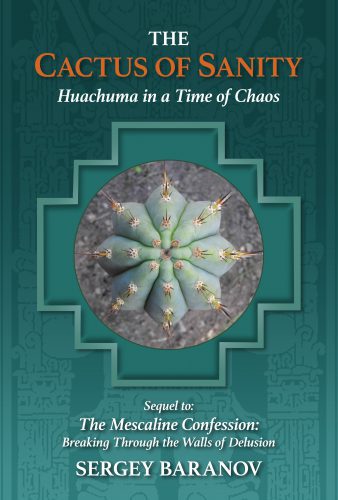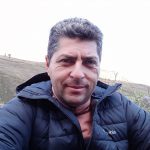Contributing writer for Wake Up World
A spoon of cactus juice a day keeps the doctor away.
A new development in the psychiatric field deserves attention, but not because it is promising and hopeful. A recent article published by the University of North Carolina makes a few important points. First is the official admission that current psychiatric drugs have serious side effects.
“Rapidly acting drugs to treat depression, anxiety, or substance abuse without side effects do not exist. Researchers led by Bryan L. Roth, MD, PhD, the Michael Hooker Distinguished Professor of Pharmacology at the UNC School of Medicine, are trying to change that. With a four-year, $27-million cooperative agreement from the Defense Advanced Research Project Agency (DARPA), Roth and colleagues will use new structural biology and computational approaches to create new medicines that work rapidly and effectively without serious side effects.” Roth later adds, “Rapidly acting drugs with antidepressant, anti-anxiety, and anti-addictive potential devoid of disabling side effects do not exist, not even as experimental compounds for use in animals. Creating such compounds would change the way we treat millions of people around the world suffering from these serious and life-threatening conditions.”
[pro_ad_display_adzone id=”110028″]
For many years, people in the field of alternative medicine have been vocal on the subject. Seeing people actually cure severe depression after only a few weeks of engagement with different plant medicines leaves them no choice but to share the good news with other fellow human beings and help them stop their mental suffering. Helping one another is a human thread — unless, of course, big money gets involved and changes the focus. Psychiatry has nearly lost its meaning since its merger with Big Pharma, which has basically turned a psychiatrist into a legal drug dealer. Busy prescribing, they have little time to provide actual therapy. But the prescribed medications, of course, are only good for short term treatment that simply masks the symptoms and gets you back to work. In fact, they should be labeled productivity boosters rather than psychiatric medicines.
No psychiatric drugs are capable of curing depression, simply because depression is a symptom of a wounded soul that will continue to suffer, regardless of the amount of drugs pumped into a body. Drugs disrupt the healthy signals coming from the depth of our psyches, telling us that something is wrong and needs attention. Instead of looking inwards and trying to figure out what needs healing, one is prescribed medications that block this signal. But the problem still persists, even when one is drugged and numb to it. In fact, it will worsen over time, since all mental health disorders have the potential for negative effects occur if left untreated.
According to Lancet, the most prestigious medical journal in the world, “depression is a major public health problem; it is a leading contributor to the global burden of disease, affecting hundreds of millions of people worldwide, and costing the USA alone more than US$200 billion each year.” People who suffer through chronic distress associated with mental health disorders can experience chemical changes in their organs, which can lead to physical problems. It also affects personal relationships with family and friends, which can lead to a number of issues, such as divorce, losing friends and isolation. Fatigue and apathy will negatively affect work and daily living. This may result in substance abuse as a form of escape from reality. Alcoholism, legal and illegal drug abuse are likely to follow. Attempted suicide is what awaits many at the end of this road.
Just think of a person who constantly suffers from headache. Instead of seeing a doctor, he might only take pain killers to help and keep doing it until his brain blew up from hypertension, which he was suffering from without knowing it. The hypertension was the cause of his headache and should have been diagnosed and addressed directly. Masking the symptoms with pain killers was a short-term solution that led to his premature death.
Another analogy can be drawn from your car. Your engine requires oil to function. The dashboard oil light comes on when your engine suffers a drop in oil pressure. Without enough oil pressure, the engine can’t lubricate itself and can stop abruptly, causing severe engine damage and an accident. Will turning off the dashboard light fix the problem of low oil pressure? Of course, not. The problem will persist until fixed or the engine breaks. Antidepressants, too, just mask symptoms while allowing the inner crisis to continue. Pharmacology is an ancient science, but pharmacology without therapy is just drugging the symptoms into oblivion, which seems to be the best modern psychiatry and pharmacology can offer. From an economic perspective, it is an excellent business model — it creates customers for life. But the economy should take a back seat when it comes to health, at least in a sane and moral society.
While Dr. Roth is correct in regard to pharmaceuticals, the whole range of natural medicine is available to treat and cure depression, anxiety, and addictions without side effects. Plant medicine does not have side effects. It may sound too good to be true to a Westerner who has never heard of plant medicine shamanism. However, those who have used plant medicines for healing can confirm it.
Here is a warning that comes on the insert of Prozac, an antidepressant that is often prescribed to treat depression:
“WARNING: SUICIDALITY AND ANTIDEPRESSANT DRUGS
Antidepressants increased the risk compared to placebo of suicidal thinking and behavior (suicidality) in children, adolescents, and young adults in short-term studies of Major Depressive Disorder (MDD) and other psychiatric disorders. Anyone considering the use of PROZAC or any other antidepressant in a child, adolescent, or young adult must balance this risk with the clinical need. Short-term studies did not show an increase in the risk of suicidality with antidepressants compared to placebo in adults beyond age 24; there was a reduction in risk with antidepressants compared to placebo in adults aged 65 and older. Depression and certain other psychiatric disorders are themselves associated with increases in the risk of suicide. Patients of all ages who are started on antidepressant therapy should be monitored appropriately and observed closely for clinical worsening, suicidality, or unusual changes in behavior. Families and caregivers should be advised of the need for close observation and communication with the prescriber.”
It further states, “There has been a long-standing concern, however, that antidepressants may have a role in inducing worsening of depression and the emergence of suicidality in certain patients during the early phases of treatment. Pooled analyses of short-term placebo-controlled trials of antidepressant drugs (SSRIs and others) showed that these drugs increase the risk of suicidal thinking and behavior (suicidality) in children, adolescents, and young adults (ages 18-24) with Major Depressive Disorder and other psychiatric disorders.”
So, you take a drug that is supposed to help you cope with your depression only to find out that the risk of suicide has been now increased, and you should be closely monitored. Nevertheless, this drug is FDA approved for safety and human consumption. How safe is it if it increases the risk of your own death? I assume that logic is a principle that should be applied in medicine. A fallacy such this simply weakens the argument for pharmaceuticals.
As the fact of serious side effects of antidepressants has been established, we now need to look at the proposed solution to the problem. DARPA has funded the development of better medication, raising more concerns. In an article titled, “Structure-Guided Drug Design Could Yield Fast-Acting Remedies for Complex Neuropsychiatric Conditions,” DARPA presents a new program called Focused Pharma, which “will pursue new drugs that work quickly and deliver lasting remedies for conditions such as chronic depression and post-traumatic stress.” In it, DARPA both confirms the undesirable side effects of antidepressants and admits that patients relapse once they stop taking them, creating addiction. They are habit-forming drugs that are prescribed for life. A relapse is inevitable as soon as the person stops taking them:
“At present, psychotherapy, psychopharmacology, and direct brain stimulation are the most effective means of treating the symptoms of neuropsychiatric conditions. While valuable, these approaches also have substantial drawbacks that make them less than ideal for treating a challenge on the scale of mental healthcare for the military community. Existing medications exhibit variable effectiveness from one individual to another, can lead to undesirable side effects, can take weeks to months to observe therapeutic benefits even when paired with counseling, and do nothing to prevent relapse once a patient stops taking them. In the case of psychotherapy and direct brain stimulation, finite availability of treatment makes it difficult to meet high demand over wide areas, and direct brain stimulation requires surgery.”
The article further describes the mechanism of the new drugs:
“The goal of the Focused Pharma program is to develop novel compounds that directly affect specific neurotransmitter signaling processes that are often implicated in neurophysiological dysfunction, while overcoming limitations of current approaches. The envisioned drugs would selectively target and bind to specific neurotransmitter receptors, and activate only specific neural signaling pathways that may impact the conditions of interest.”
Neurons communicate with one another via chemical and electronic means. One neuron sends a message to another neuron. Neurotransmitters are the chemical messengers released from neurons to “talk” to other neurons. Receptors, on the other hand, are the cells that “hear” the message. In other words, a new drug will filter and choose which neural signaling in a brain should be allowed by artificially disrupting the neurotransmitters’ communication with the receptors. To return to my car analogy, imagine your brain is a car dashboard whose lights could be switched off at will. What happens if your oil light is switched off and you keep driving without oil? You destroy your engine.
Another important revelation can be found in DARPA’s report. On one hand they admit the therapeutic value of psychedelic substances, and on the other, they dismiss it due to the “side effects” they call “hallucination.”
“In creating Focused Pharma, DARPA examined evidence from privately funded human clinical studies demonstrating that certain Schedule 1 controlled drugs that engage serotonin receptors show promise of rapid and long-lasting therapeutic effect in treating neuropsychiatric conditions such as chronic alcohol dependence, post-traumatic stress, and treatment-resistant depression following only limited doses. However, because such drugs act on many neurotransmitter receptors and receptor subtypes in the brain without specificity and indiscriminately activate numerous signaling pathways, they produce significant side effects, including hallucination. These effects, coupled with their unpredictable consequences, render the drugs unusable in a military healthcare setting.”
I thoroughly explore the subject of ‘’hallucination’’ vs. visions, which are the language of plant medicines, in my previous book, The Mescaline Confession: Breaking Through the Walls of Delusion. Here, I would like to draw attention to what appears to me to be a discrepancy. All the studies that have been done on psilocybin were done predominantly with micro-dosing, which means the usage of a minimal effective dose that does not create “hallucination.” Micro-dosing, or what I call a therapeutic dose, a dose that is low enough that is unlikely to produce a fully blown psychedelic effect but high enough to allow the cellular response to be felt and observed. I wouldn’t be able to write this chapter if I took a full dose of Huachuma medicine. I would be sitting by the river now, merging with the Universe. But a micro-dose of Huachuma allows me to stay home and use my computer for writing.
A quite revealing and unbiased article published in Lancet titled, “Psilocybin with psychological support for treatment-resistant depression: an open-label feasibility study” makes a number of important revelations. First it affirms the millennia-long use of psilocybin for healing: “Psilocybin is a naturally occurring plant alkaloid found in the Psilocybe genus of mushrooms. Psilocybe mushrooms have been used for millennia for healing purposes but were only discovered by modern science in the late 1950s.” Its language omits the word “shamanism,” the oldest spiritual healing practice in the world, which used different plant medicines for physical and mental healing. Nevertheless, it cites the historical fact that often gets ignored by academia and science.
The article further speaks of health benefits of plant medicines and confirms their safety: “Enhanced cognitive flexibility, associative learning, cortical neural plasticity, and antidepressant responses have been reported with 5-HT2A receptor agonism in animals, and increased and sustained improvements in wellbeing and optimism have been observed after psychedelic experiences in human beings. Findings from human imaging studies with psilocybin have supplemented these discoveries, showing changes in brain activity suggestive of antidepressant potential; for example, a range of effective antidepressant treatments have been found to normalize hyperactivity in the medial prefrontal cortex and we found reduced blood flow in this region with intravenous psilocybin. Moreover, data obtained from large-scale population studies have recently challenged the view that psychedelics negatively affect mental health, with one study’s findings showing lower rates of psychological distress and suicidality among people who had used psychedelics within their lifetime than among those who used no psychedelics but an equivalent amount of other drugs. In modern trials, psychedelics have been found to reduce anxious, depressive, and obsessive-compulsive symptoms, as well as addictive behaviours, often for several months after just one or two exposures. Extensive historical and modern evidence now supports the view that, administered in a controlled environment with appropriate support, psychedelics have a favourable safety profile.”
It goes on to relate the rapid reduction in depressive symptoms just after one psilocybin or Ayahuasca session, which lasted for weeks: “We also found one report documenting enduring decreases in depressive symptoms after a single dose of psilocybin in a randomised controlled trial of psilocybin-assisted psychotherapy for end-of-life anxiety, one report on an open-label trial showing rapid decreases in depressive symptoms that endured for up to 21 days after a single dose of ayahuasca, and two early reports or case studies on the effects of lysergic acid diethylamide on ‘neurotic’ and depressive symptoms describing ‘improvements,’ albeit without validated measures of symptom severity.” This shows the effectiveness of plant medicine with only one session. This is also why at our retreat center, we recommend at least five to seven consecutive sessions during a two week period to facilitate deeper and lasting healing. During this time the plant medicine has a chance to recalibrate brain chemistry, which often results in permanent healing.
The Lancet study encourages “further research into the efficacy of psilocybin with psychological support for major depression. Larger-scale randomised controlled trials are warranted to better examine the potential of psilocybin as a treatment option for this highly prevalent, disabling, costly, and difficult-to-treat disorder. More broadly, the present study should help to catalyse the re-emergence of a promising research area in psychiatry.”
I am not a psilocybin person, I am a mescaline guy. I don’t have a dog in this fight. But fair is fair and credit must be given when credit is due. These, of course, are baby steps by science, but steps in the right direction nevertheless. Personally, for me, there is no debate on the subject. I know from experience the healing potential of Ayahuasca and, particularly, the Huachuma cactus, which has proven its efficacy to me way over a thousand times. For anyone who has taken a serious look at psychedelics, the notion of revolutionizing psychiatry by designing new drugs is no different than reinventing the wheel. The medicine wheel was created before humanity rose from its primitive state and perhaps was assisted by sacred plants on the way to its current condition. Reinventing the medicine wheel is not an attempt to revolutionize medicine, since the revolution has already happened in a prehistoric distant past. Most likely, it is about market shares and a desire to get deeper inside our minds. One way to look at why DARPA speaks unfavorably about psilocybin treatment of soldiers is that by taking psilocybin, a soldier might suddenly realize that being a soldier and being ready to die for a paycheck and make a living by killing is not the best way to spend his life.
The prospect that soldiers may quit as an “undesirable” effect of psilocybin treatment is perhaps the sole reason that DARPA rejects making it available for them. The same is true for civilians who, after a psychedelic experience, suddenly realize that they were not doing what they wanted in life. I’ve heard many stories about people who, after just one such experience, changed careers. This, of course, leads to personal healing, for a person cannot be happy if he hates the job to which he dedicates most of his time and energy. Psychedelics make you think for yourself, and that is the reason why they are heavily controlled by the powers that shouldn’t be. To better understand this subject, I would highly recommend reading Aldous Huxley’s 1931 dystopian novel, Brave New World. Written almost a century ago, it describes our modern drug-addled, brainwashed society in shocking detail. Huxley saw the future.
There is also another concern which might not be known even to the researchers. What are the long-term effects of these new drugs on your receptors? Will they still be active after the drugs’ chemical targeting? If your receptors burn out, it will make you insensitive to plants. Psychedelic experience will be impossible for you in the future. In other words, it will make you psychoactively infertile. And just as sterilized people cannot procreate, you will not be able to produce psychedelic experiences when taking any substances or plants. On the contrary, we know that plant medicine does not fry receptors and does not have negative side effects. It is highly compatible with human physiology and psychology, and its testing time is measured by thousands of years of cultural experience. Approved for safety and effectiveness by either God or the force of evolution, whichever you prefer to believe, it is here to help us heal, reconnect and cherish life.
Another worrisome trend is coming from Silicon Valley. One would expect this field to be confined within digital walls. However, for reasons we can only guess, Silicon Valley is now moving into the field of health care, pharmacology and medicine. The merger of Big Tech with Big Pharma is described in the article “When two worlds collide — big pharma meets big tech.” It is not hard to imagine a future when your thoughts will be edited like genes, and your inner content gets deleted like politically incorrect Facebook posts that moderators deem to go against community standards.
I trust Mother Nature, who has withstood the test of time, more than digital technology for drug discovery. I choose to follow the intelligence of the Earth rather than algorithms and artificial minds. But if that wasn’t enough to worry about, now there is DARPA’s involvement in mental health care. Militarized psychiatry sounds an alarm for anyone who is aware of MK-Ultra, a top-secret CIA project in which the agency conducted hundreds of experiments on people to assess the potential use of LSD and other drugs for mind control, interrogation, information gathering and psychological torture. The program came to the public eye only in 1975 during congressional investigations into illegal CIA activities within the United States and abroad. Considering that this dark episode of the U.S. government lasted for 20 years and ruined countless minds by forcing LSD on people without their consent or knowledge, DARPA’s involvement in mental health raises serious concerns. It’s hard to trust a Terminator in white robe.
From talking to many people of different ages, genders and countries over the years who all have suffered from depression and were prescribed different antidepressants at different times, I saw a recurring pattern in their reports, among them, the feeling of partial living. It was as though a part of their brain was turned off by the prescribed medication so they could not think about their problems, and another part was turned on, so that they could go to work. Convinced by their doctors that this new feeling of being themselves was healthy and normal, they did not entertain the idea of seeking healing from plants. This half-living was the best pharmaceutical solution to a problem. But not being able to think about your problems does not fix your problems. The problems persist and worsen with time. Plant medicine takes you directly to your problem so you can see it, understand it and heal by making necessary changes in your life. Healing comes with understanding and clarity. The chemical part of it is automatic and needs no interference.
 Mental health issues certainly require a lot of attention, and using plant medicine is certainly one right approach. However, and this must be said, treating sacred plants merely as natural antidepressants that are only useful to help with mental issues is like suggesting that a bazooka is only good for shooting birds. There is so much more to plant medicine than depression treatment, which is simply ignored by mainstream science. Science acts as though shamanic cultures have never existed, or if they did, their millennia-old, rich traditions and knowledge of healing plants have no value. Nothing is further from the truth. In fact, its value is hard to overstate.
Mental health issues certainly require a lot of attention, and using plant medicine is certainly one right approach. However, and this must be said, treating sacred plants merely as natural antidepressants that are only useful to help with mental issues is like suggesting that a bazooka is only good for shooting birds. There is so much more to plant medicine than depression treatment, which is simply ignored by mainstream science. Science acts as though shamanic cultures have never existed, or if they did, their millennia-old, rich traditions and knowledge of healing plants have no value. Nothing is further from the truth. In fact, its value is hard to overstate.
In the light of current events and a growing competition for the human mind, it becomes urgent to resort to Nature that actually heals. It is time to reclaim one’s mind from psycho-pharmaceutical dependency and give Nature a chance. We don’t need new drugs. What we need is to return to Mother Nature. It works.
This article is an excerpt from the new book by Sergey Baranov, “The Cactus of Sanity: Huachuma in a Time of Chaos“.
About the author:
 Sergey Baranov is the founder of Huachuma Wasi, a healing center in The Sacred Valley of the Incas, Peru. He is the author of Path: Seeking Truth in a World of Lies, The Mescaline Confession: Breaking Through the Walls of Delusion and The Cactus of Sanity: Huachuma in a Time of Chaos. Sergey’s passion for life on Earth and its preservation is the driving force behind his work. You can contact Sergey at www.huachumawasi.com.
Sergey Baranov is the founder of Huachuma Wasi, a healing center in The Sacred Valley of the Incas, Peru. He is the author of Path: Seeking Truth in a World of Lies, The Mescaline Confession: Breaking Through the Walls of Delusion and The Cactus of Sanity: Huachuma in a Time of Chaos. Sergey’s passion for life on Earth and its preservation is the driving force behind his work. You can contact Sergey at www.huachumawasi.com.
Recommended articles by Sergey Baranov:
- Huachuma: The Unforgettable Mystery
- Is Cannibalism the Solution to Food Sustainability in the Future?
- Climate Solutions are Obvious – But Profit and Politics Stand in the Way
- A Shamanic Bridge to a Better Future
- What is Shamanic Healing?
- Consciousness in Exile: A Shamanic Perspective
- A.I. and the Synthetic Reality – A Shamanic Perspective
- Psychedelic Spirituality
- Why Consciousness Expanding Plants Are Feared And Deemed Illegal
- Mescaline: An Ancient Medicine for the Soul
[pro_ad_display_adzone id=”110027″]






